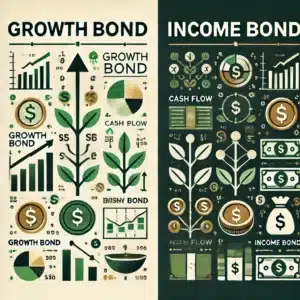In this Go Asset Finance Growth Bond review, we’ll explore the investment opportunity from asset finance services provider Go Asset Finance Ltd.
We’ll delve into the bond’s terms and features, advantages and disadvantages, and eligibility to invest. But before we get into those, we’ll define what is a growth bond and see how it differs from an income bond.
If you are looking to invest as an expat or high-net-worth individual, which is what I specialize in, you can email me (advice@adamfayed.com) or WhatsApp (+44-7393-450-837).
As these Go Asset Finance bonds are deemed riskier than more conventional ones, it would be best to seek advice. This post is only for informational purposes and should not be relied solely on for any investment decision. Some facts could change from the time of writing.
What are growth bonds?
These bonds are a kind of fixed-income instrument that, alongside regular interest payments, seeks to offer capital expansion over time.
Growth bond vs income bond

Investment objectives differ between growth bonds and income bonds.
Growth bonds usually invest in assets predicted to increase significantly in value, such as growth-oriented funds or stocks.
Because of their ability to improve in value over the long term, they are popular among investors seeking capital gains rather than instant profits.
Alternatively, those who value consistent income over capital gains may choose income bonds which pay out monthly interest or dividend. Such typically invest in well-established, stable businesses with predictable cash flow.
Go Asset Finance Growth Bond Review
Fixed Interest Tax-Free ISA Growth Bond
This investment instrument has a two-year term and accumulates interest annually. Investors receive both their initial capital investment and the 25.44% accrued interest at the conclusion of the term.
The bond is backed by a combination of fixed and floating charges on the assets of Go Asset Finance.
The GBP-denominated bond requires a minimum investment of 10,000 pounds and pays out a yearly interest rate of 12%.
Fixed Interest Corporate Growth Bond
This two-year investment bond is secured by all the assets of the issuer. You can invest in pounds, euros, or US dollars, with an investment minimum of requirement of 10,000.
You won’t be paid any interest for two years. Rather, at the conclusion of the period, your initial investment and all income collected will be returned.
The bond bears an annual compound interest rate of 15%, which is a significant rate of return. In addition to receiving your entire investment back when the bond matures, you will have accrued 32.25% in interest.
Perpetual Growth Bond

This fixed interest bond, issued April 2, 2024, is denominated in US dollars and is available for trade. You need to invest at least $100,000 to participate.
The bond provides a compelling 15% yearly compound interest yield.
The Go Asset Finance perpetual growth bond has no set maturity date, so interest is only paid when you decide to redeem them. You are eligible to request redemption after owning the bond for a minimum of two years.
Bondholders can sell or transfer their holdings as needed since this bond is both transferable and marketable.
Who can invest with Go Asset Finance?
Investments can be made by high net worth individuals, groups, institutions, knowledgeable and experienced investors, plus other authorized individuals.
Pros and cons of Go Asset Finance growth bonds
Growth bond benefits
- hose looking for greater profits find the interest rates to be enticing. The effective yield is raised by compound interest.
- It’s protected by a fully enforceable fixed and floating debenture covering the entire business.
- The bonds can be traded through Clearstream and are listed on reliable exchanges.
- With an annual interest rate compounding at 15% and no fixed maturity date, the Perpetual Listed Income and Growth Bond provides flexibility.
Growth bond risks
- For other investors, high minimum transaction amounts may be prohibitive, like the $100,000 minimum for some bonds.
- The bonds may have less liquidity than more conventional bonds even when they are tradeable.
- Similar to other bonds, there are risks related to changes in interest rates and market conditions.
- For less seasoned investors, it may be difficult to comprehend the debenture security and compound interest computations.
Pained by financial indecision?

Adam is an internationally recognised author on financial matters with over 830million answer views on Quora, a widely sold book on Amazon, and a contributor on Forbes.



